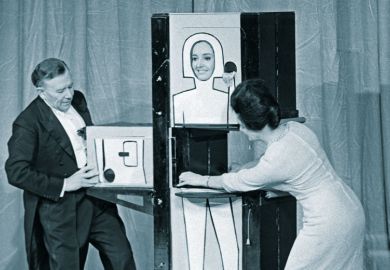The apparently low turnout at last week’s higher education strike ballot seemed a bit of a puzzle to many people.
Only just over half of the University and College Union’s branches at the universities that pay into the Universities Superannuation Scheme (USS) cleared the 50 per cent turnout threshold for strikes over pensions, and only about a third cleared the same hurdle to strike over pay and conditions.
Outsiders used to hearing fire and brimstone about pay, conditions and pensions were as puzzled as more committed colleagues about why on Earth people would join a trade union and then not even bother to vote when their lifetime earnings are being slashed.
The answer – and you’d expect any academic to say this – is both complex and hard to access. It is encoded in a number of structural and more short-term factors that need careful unpacking, not the angry shouting that characterises most of the sector’s industrial relations these days.
The first thing to say is that the turnout was not by any means unusual. The overall figure was 53 per cent for the pension strike and 50.6 per cent for action over pay and conditions. But if we go back to October 2019 (which now seems like a lifetime ago), the results of UCU’s previous ballot weren’t that different: a 53 per cent turnout on pensions, and 49 per cent on pay and conditions. So from that perspective, turnout is actually a little up this time. It’s not particularly disappointing, especially given the ballot’s short turnaround.
On the other hand, you really might expect rather more engagement when many colleagues in the USS could face the loss of a third of their salary in retirement, according to union figures. Employers insist the reduction is up to 18 per cent; either way, suddenly seeing six figures and more going up in smoke ought to focus the mind. Many years of pay restraint, ballooning workloads and the spread of grotesque precarity should surely do the same. So what’s going on?
One standing reality is that organising university staff really is like herding cats. Academics, especially, might come into the office less than they work at home or in the field, especially when campus activities are still limited by Covid.
Lecturers’ sense of themselves as a group is stymied by professional individualism: although they are clearly employees, they also see themselves in some sense as self-starting experts, like lawyers or general practitioners. It’s very difficult to get them together and all marching in the same direction.
To that structural reality, we have to add some near-term developments. The first is that many staff feel more than sympathetic to the Covid generation’s educational plight: the inevitable upcoming strikes will mean that many will have experienced three years of disrupted studies. Some of the academics balloted (not just the abstainers but the no voters, too) simply could not bring themselves to inflict even more damage.
Then there’s the harm Covid itself has wrought on academics themselves. Many university employees are simply physically and psychologically exhausted (many workers across the economy feel the same). They either cannot summon the energy to engage in these campaigns, or they have given up on seeing meaningful change within the sector and are just getting their heads down for the long slog ahead.
Battered by Covid, bruised by casualisation, threatened by departmental closures and, above all, ground down by years of working double their contracted hours, some UCU members are also fuming about the union’s political and industrial strategy. Few will come out and say it, but they believe the union at the top to be a badly run vehicle for partisanship and ambition.
However understandable the UCU’s Four Fights (pay, workload, equality, casualisation) campaign may be, many colleagues have been left unimpressed by the yoking of that across-the-board battle to the pensions dispute, amid a constant drumbeat of simplistic anti-government rhetoric. Those colleagues want a more focused and disciplined approach.
Then again, it’s not clear that an increasingly fissiparous and divided sector could ever really be rallied as one. Among many older colleagues, there is the realisation that most of their own pensions will remain secure, since the benefits they’ve already paid in for will remain untouched. Younger colleagues often express pessimism, indeed fatalism, that there will even be any pensions to argue over at all by the time they retire.
Consider the structure of USS cuts. These are likely to fall, for now, on the better paid – but if you’re a member of professional services staff, or you’re a part-time or short-contract lecturer, that’s much less likely to affect you.
Moreover, many lower-paid staff, in particular, simply cannot afford to go on strike – and it’s here where the political economy of a messy and chaotic sector bears on the problem. Casualisation is eroding the basis of solidarity because the low-paid cannot support either collective action, or higher pension contributions, to keep the present system going.
Last but by no means least, university staff know that industrial action will be about as popular among the general public as Owen Paterson’s lobbying activity. They are already bearing the brunt of “this is the last straw”-style headlines in the newspapers, and they’ll be a sitting duck for a government quite happy to create enemies if they really go for it.
It’s not a pleasant prospect for university staff to contemplate. Most of them didn’t go into higher education to get involved in no-holds-barred conflict. Most of them went into what they thought were stable public sector jobs. Now those jobs are not stable, and that’s corroding everything – not just universities’ ethos and atmosphere, but employees’ own ability to fight back.
Glen O’Hara is professor of modern and contemporary history at Oxford Brookes University. He is the author of a number of books on modern economic and social policy, most recently The Politics of Water in Post-War Britain (2017). He is currently principal investigator of the AHRC-funded project “All Our Footsteps: Tracking, Mapping & Experiencing Rights of Way in Post-War Britain” and is writing a book about the Blair governments of 1997-2007.

